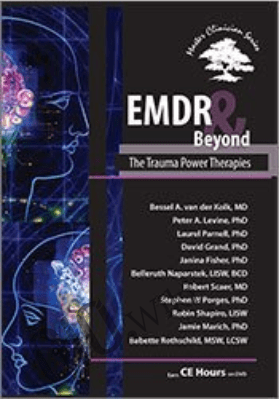Janina Fisher , Bessel Van der Kolk , Peter Levine , Jamie Marich , Babette Rothschild , Belleruth Naparstek , Robert Scaer , Stephen Porges , David Grand , Laurel Parnell & Robin Shapiro
About Author
Janina Fisher, Ph.D. is a licensed clinical psychologist and former instructor at The Trauma Center, a research and treatment center founded by Bessel van der Kolk. Known as an expert on the treatment of trauma, Dr. Fisher has also been treating individuals, couples and families since 1980.
She is past president of the New England Society for the Treatment of Trauma and Dissociation, an EMDR International Association Credit Provider, Assistant Educational Director of the Sensorimotor Psychotherapy Institute, and a former Instructor, Harvard Medical School. Dr. Fisher lectures and teaches nationally and internationally on topics related to the integration of the neurobiological research and newer trauma treatment paradigms into traditional therapeutic modalities.
She is co-author with Pat Ogden of Sensorimotor Psychotherapy: Interventions for Attachment and Trauma (2015) and author of Healing the Fragmented Selves of Trauma Survivors: Overcoming Internal Self-Alienation (2017) and the forthcoming book, Working with the Neurobiological Legacy of Trauma (in press).
Bessel A. Van der Kolk, M.D., is a clinician, researcher and teacher in the area of post-traumatic stress. His work integrates developmental, neurobiological, psychodynamic and interpersonal aspects of the impact of trauma and its treatment.
Dr. van der Kolk and his various collaborators have published extensively on the impact of trauma on development, such as dissociative problems, borderline personality and self-mutilation, cognitive development, memory, and the psychobiology of trauma. He has published over 150 peer reviewed scientific articles on such diverse topics as neuroimaging, self-injury, memory, neurofeedback, Developmental Trauma, yoga, theater and EMDR.
He is founder and medical director of the Trauma Center in Brookline, Massachusetts. The Trauma Center consists of a well-trained clinical team specializing in the treatment of children and adults with histories of child maltreatment, that applies treatment models that are widely taught and implemented nationwide. He also created the Trauma Research Foundation, the non-profit arm of the Trauma Center, that is organized to promote clinical, scientific and educational projects.
His most recent 2014 New York Times best seller, The Body Keeps the Score: Brain, Mind, and Body in the Treatment of Trauma, transforms our understanding of traumatic stress, revealing how it literally rearranges the brain’s wiring – specifically areas dedicated to pleasure, engagement, control, and trust. He shows how these areas can be reactivated through innovative treatments including neurofeedback, somatically based therapies, EMDR, psychodrama, play, yoga, and other therapies.
Dr. van der Kolk is the past president of the International Society for Traumatic Stress Studies, and professor of psychiatry at Boston University Medical School. He regularly teaches at conferences, universities, and hospitals around the world.
Peter A. Levine, Ph.D., holds doctorates in both medical biophysics and psychology. The developer of Somatic Experiencing®, a body-awareness approach to healing trauma, and founder of the Somatic Experiencing Trauma Institute, which conducts trainings in this work throughout the world and in various indigenous cultures, with 26 faculty members and over five thousand students.
Dr. Levine was a stress consultant for NASA on the development of the space shuttle project and was a member of the Institute of World Affairs Task Force of Psychologists for Social Responsibility in developing responses to large-scale disasters and ethno-political warfare. Levine’s international best seller, Waking the Tiger: Healing Trauma, has been translated into 22 languages. His recent interests include the prevention of trauma in children, and he has co-written two books, with Maggie Kline, in this area: Trauma Through a Child’s Eyes and Trauma-Proofing Your Kids.
His most recent book: In an Unspoken Voice: How the Body Releases Trauma and Restores Goodness, was recently released to rave reviews. Levine’s original contribution to the field of Body-Psychotherapy was honored in 2010 when he received the Life Time Achievement award from the United States Association for Body Psychotherapy (USABP).
Jamie Marich, Ph.D., LPCC-S, LICDC-CS, RMT is the author of Trauma Made Simple: Competencies in Assessment, Treatment and Working with Survivors (PESI, 2014), EMDR Made Simple: 4 Approaches for Using EMDR with Every Client (PESI, 2011), and two other books on trauma recovery. Marich began her career in human services working in humanitarian aid in Bosnia-Hercegovina from 2000-2003. Jamie's journey with EMDR began as a client in 2004, and she's offered EMDR Therapy as a clinician since 2006.
An EMDRIA Certified Therapist, Approved Consultant, and Continuing Education Provider, Jamie was the EMDRIA Research Poster Award Winner in 2008 for her qualitative research on EMDR and addiction. Jamie's doctoral dissertation on the use of EMDR in addiction continuing care was published in Psychology of Addictive Behaviors, a major APA journal. As of 2015, Jamie and her training company (The Institute for Creative Mindfulness) are providers of EMDRIA-Approved Basic Training Courses in EMDR Therapy.
Jamie travels internationally speaking on topics related to EMDR, trauma, addiction, and mindfulness while maintaining a private practice (Mindful Ohio) in her home base of Warren, OH. She is the developer of the Dancing Mindfulness practice and a Reiki Master teacher. She also completed the StreetYoga Trauma-Informed Teacher Training Program and she is a Certified Yoga of 12-Step Recovery Facilitator/Space Holder. Jamie is also the author of Dancing Mindfulness: A Creative Path to Healing and Transformation (Skylight Paths Publishing, 2015).
Babette Rothschild, MSW, LCSW has been a practicing psychotherapist and body-psychotherapist since 1976 and a California Licensed Clinical Social Worker since 1978. She is a member of the International and European Societies for Traumatic Stress Studies, the Association of Traumatic Stress. Babette has trained extensively in Transactional Analysis, Gestalt Therapy, Psychodrama, Eye Movement Desensitization and Reprocessing and Somatic Experiencing, and is a certified Bodynamic Analyst and certified Radix Teacher. She has written extensively on trauma. Her works include 8 Keys to Safe Trauma Recovery; HELP for the HELPER: The Psychophysiology of Compassion Fatigue and Vicarious Trauma (with Marjorie Rand); THE BODY REMEMBERS: The Psychophysiology of Trauma and Trauma Treatment; THE BODY REMEMBERS CASEBOOK: Unifying Methods and Models in the Treatment of Trauma and PTSD; Trauma Essentials: The Go-to Guide.
Belleruth Naparstek, LISW, BCD: Psychotherapist, author and guided imagery innovator Belleruth Naparstek is the creator of the popular, Time Warner Health Journeys guided imagery audio series. Her first book, Staying Well with Guided Imagery, is a widely used wellness primer. Her second, Your Sixth Sense, has been translated into 8 languages and called one of the most thoughtful and sophisticated looks at intuition in print. Her latest book on imagery and posttraumatic stress, Invisible Heroes: Trauma Survivors and How They Heal, was released in late 2004, won the Spirituality & Health Top 50 Books Award and is out in paperback January of 2006.
Robert Scaer received his B.A. in Psychology, and his M.D. degree at the University of Rochester. He is Board Certified in Neurology, and has been in practice for 39 years, twenty of those as Medical Director of Rehabilitation Services at the Mapleton Center in Boulder, CO. His primary areas of interest and expertise have been in the fields of brain injury and chronic pain, and more recently in the study of traumatic stress and its role in all mental illness, as well as in physical symptoms and many chronic diseases. He has lectured extensively on these topics, and has published several articles on the whiplash syndrome and other somatic syndromes of traumatic stress. His first book, The Body Bears the Burden: Trauma, Dissociation and Disease, presents a new theory of dissociation and its role in many diseases. A second book, The Trauma Spectrum: Hidden Wounds and Human Healing, released in July, 2005, explores the insidious spectrum of culturally-based trauma that shapes our lives, and how transformation and healing may still take place. He is currently retired from clinical medical practice, and continues to pursue a career in writing and lecturing.
Stephen W. Porges, PhD, is Distinguished University Scientist at Indiana University, where he is the founding director of the Traumatic Stress Research Consortium within the Kinsey Institute. He holds the position of Professor of Psychiatry at the University of North Carolina and Professor Emeritus at the University of Illinois at Chicago and the University of Maryland.
He served as president of both the Society for Psychophysiological Research and the Federation of Associations in Behavioral & Brain Sciences and is a former recipient of a National Institute of Mental Health Research Scientist Development Award. He has published more than 300 peer reviewed scientific papers across several disciplines including anesthesiology, biomedical engineering, critical care medicine, ergonomics, exercise physiology, gerontology, neurology, neuroscience, obstetrics, pediatrics, psychiatry, psychology, psychometrics, space medicine, and substance abuse.
In 1994 he proposed the Polyvagal Theory, a theory that links the evolution of the mammalian autonomic nervous system to social behavior and emphasizes the importance of physiological state in the expression of behavioral problems and psychiatric disorders. The theory is leading to innovative treatments based on insights into the mechanisms mediating symptoms observed in several behavioral, psychiatric, and physical disorders.
He is the author of The Polyvagal Theory: Neurophysiological foundations of Emotions, Attachment, Communication, and Self-regulation (Norton, 2011), The Pocket Guide to the Polyvagal Theory: The Transformative Power of Feeling Safe, (Norton, 2017) and co-editor of Clinical Applications of the Polyvagal Theory: The Emergence of Polyvagal-Informed Therapies (Norton, 2018).
He is the creator of a music-based intervention, the Safe and Sound Protocol™, which currently is used by more than 1000 therapists to improve spontaneous social engagement, to reduce hearing sensitivities, and to improve language processing, state regulation, and spontaneous social engagement.
David Grand, PhD, is the developer of Brainspotting and has trained more than 8,000 therapists internationally. He’s the author of Brainspotting: The Revolutionary New Therapy for Rapid and Effective Change.
Laurel Parnell, Ph.D. is one of the world’s leading experts on EMDR. A clinical psychologist, she has trained thousands in EMDR in her international workshops. Dr. Parnell is the author of A Therapist’s Guide to EMDR, EMDR in the Treatment of Adults Abused as Children, Transforming Trauma: EMDR, and Tapping In: A Step-by-Step Guide to Activating Your Healing Resources Through Bilateral Stimulation as well as articles and a chapter in the EMDR Casebook. Dr. Parnell is at work on her newest book: Attachment-Focused EMDR: Healing Relational Trauma, which will be published by WW Norton in 2013. Dr. Parnell has served on the faculty of the California Institute for Integral Studies and John F. Kennedy University.
An EMDR pioneer and innovator, Dr. Parnell has immersed herself in the practice and development of EMDR since 1991 bringing a client-centered attachment-focused approach to the work. A frequent presenter at conferences, she has been interviewed for television, radio and print. She maintains a private practice in San Rafael, California.
Robin Shapiro, LISW is an author, psychotherapist and an EMDRIA-approved consultant, offering consultation to psychotherapists on the gamut of psychotherapy issues including trauma, attachment, endogenous disorders, and countertransference issues. Author of three books, EMDR Solutions I, EMDR Solutions II and The Trauma Treatment Handbook. Leader of EMDR-related workshops including the Two-Hand Interweave, EMDR with Cultural and Generational Issues, Depression, Obsessive-Compulsive Personality Disorders, Medical Issues, Anxiety Disorders, Couples, Complex Trauma and Dissociation. She has presented these workshops at regional and international EMDR International Association conferences and, for many years in, in the Part Two of an EMDR Weekly Class.

![© GiO Wiki - Courses [BigData]](/assets/img/user_mobile.png)

